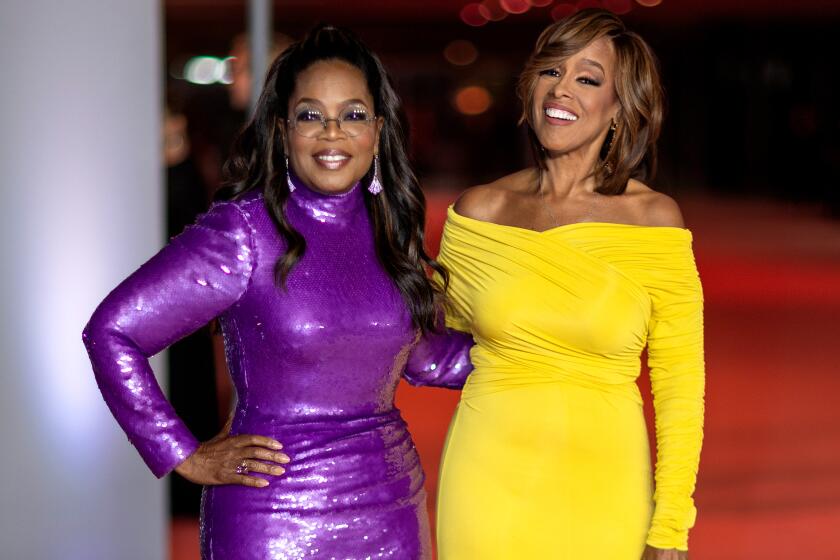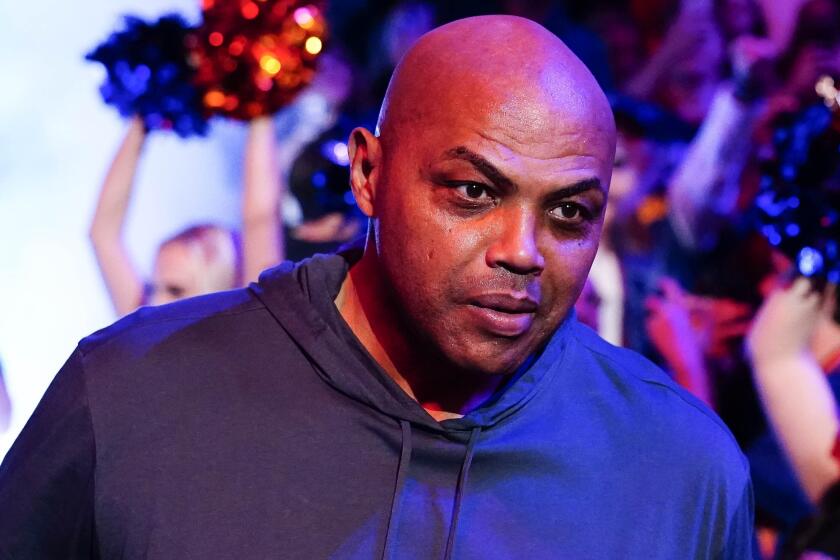Roundtable Writing: A Headache for Guild : Movies: The issue of multiple screen credits for writers is taking a new turn. If the trend of using a roundtable emerges, will it diminish the stature of the screenwriter?
Roundtable writing--creating or, more often, fine-tuning a script collectively--is a time-honored tradition in television, the underpinning of comedies ranging from Sid Caesar’s “Your Show of Shows” to “Murphy Brown.”
The recent and controversial use of that process for the big screen, however, has, thus far, provoked more aggravation than laughs. By positioning writer as “jokester” instead of writer as “auteur” and raising the issue of multiple credits, say critics of the process, a roundtable not only diminishes the stature of the screenwriter but bogs down an industry already mired in mediocrity.
“If the studios’ intention is to imitate the quality of an average TV sitcom,” says writer Gary Ross (“Dave,” “Big”), “then roundtable writing is a very effective way of doing that.”
Adds Amy Ephron, who wrote the original script for Warner Bros.’ “The Little Princess”: “The really great movies have tended to be written by one person. They’re less homogenized, have better characters and a much clearer vision. Writing is not a communist enterprise.”
*
Tom Pollock, motion picture group chairman of MCA/Universal--thus far the primary employer of the roundtable technique--prefers the term egoless. Although he would never have considered having “Schindler’s List” written on that basis, he says, when it came to beefing up humor and polishing dialogue on comedies such as Amblin Entertainment’s upcoming “The Little Rascals,” “Casper” and “The Flintstones,” the group dynamic worked.
“Since the Writers Guild agenda is to establish creative parity with directors, roundtable writing could be seen as potentially demeaning,” Pollock says. “But is it any worse than ‘serial monogamy’--hauling in one writer after another to rewrite? In an industry in which the top writers work and get paid a lot and none of the others do, what’s so bad about employing eight more people? This topic, I’m sure, will be part of collective bargaining during the (1995) contract talks.”
Frank Pierson, president of the WGA West, hopes it doesn’t come to that. The union, which has been responsible for determining writing credits since the 1940s, has a Contract Adjustment Committee that could negotiate amendments averting a clash before that date. The guild is also forming a task force to make recommendations to the committee.
Their task, says Pierson, is to review the current rules against granting credit to more than two writers (or two-person writing teams) unless a waiver is obtained in advance. In most cases, the maximum, even with a waiver, is three. Should that prohibition be lifted, the committee will attempt to protect roundtable writers from exploitation on the part of a studio out to cut corners on writing fees and health and pension benefits.
“It’s unconscionable for the guild not to review the policy because, in the real world, people are working this way,” Pierson says. “Our membership has to decide whether roundtable writing is acceptable--and my personal opinion is that it is. It provides work. It can create good product. The problem is coming up with a credit ‘card’ (on-screen) that doesn’t belittle the work of the writer in the eyes of those who see it.”
The issue came to a head in late December when Universal submitted what is probably a record-setting eight names--seven roundtable writers plus writer/director Brian Levant--for credit consideration on “The Flintstones,” the studio’s $40-million Memorial Day release. The first script was written by Steven de Souza (“Die Hard”) in 1987 for Hanna-Barbera before Universal optioned the rights. Since that time, drafts were penned by six other writers or by teams of writers, and there were three additional versions by the roundtables brought in by Levant.
Several writers, including De Souza and the team of Tom S. Parker and Jim Jennewein, wrote letters to the guild protesting the submission of roundtable material without a waiver. Shortly thereafter, Pierson instructed the membership to pass on any roundtable assignments unless cleared in advance. Some guild members charge that the union dragged its feet on the matter. In the absence of a waiver, they ask, why did it inform the 32 “Flintstones” writers that the matter would go before arbitration? Why did the union meet with Levant twice rather than turn down the eight-person credit submission cold?
“Universal wasn’t to blame,” said Ross, one of the “Flintstones” writers. “It’s not their job to exercise prior restraint but our’s to enforce our own rules which, for a while, the guild clearly didn’t do.”
Pierson challenges that perspective. “Passions often run high on credit arbitrations, and you have to be flexible reading the rules,” he says. “We weren’t about to throw out the application of eight legitimate members of the guild without a fair hearing.”
The WGA was spared a pre-arbitration hearing on the waiver issue recently when Universal abruptly withdrew its Levant-team submission and asked that Parker and Jennewein be given writing credit instead. Michael Wilson was to be credited with the “story.”
Levant (“Beethoven”) cautions that Universal’s about-face should not be interpreted as an acknowledgment that roundtable writers are ineligible for credit.
“It was our decision to withdraw our names,” he explains. “It wasn’t a pleasant situation, and we didn’t feel like making it the issue of our lives. Letters, lawyers . . . we’d rather be comedy writers. I didn’t know for a long time that Universal hadn’t requested a waiver as I requested.”
Universal’s Pollock maintains that there was no need for a waiver. Since the composition of the groups changed weekly, he says, there was no ongoing “team.” Despite the fact that WGA rules tend to favor the original writer, he had opted not to submit the writer’s name for credit since his script was never optioned by the studio.
De Souza, nevertheless, is confident he will win out in the end, in an arbitration precipitated by a letter of protest filed by the writing team of Daniel and Joshua Goldin.
“The final script is strikingly similar to what I wrote seven years ago,” De Souza says. “The main story line and many scenes are identical. . . . I have no problem with roundtable writing--as long as it’s acknowledged the way it often is in TV--in additional credits at the end of the show instead of in the writing credits upfront.”
In the upcoming weeks, the final script will be sent out to a panel of three anonymous guild members who will make independent credit recommendations. Though roundtable writing is not an issue this time around, no one doubts it will surface before long.
Brian Grazer, co-chairman of Imagine Films Entertainment, says it could probably be a viable way of turning out movies in an industry hungry for product.
“If a script is good, what does it matter how many people wrote it?” asks Grazer. “And, who know where it could lead? Writers from ‘Seinfeld’--TV people who who otherwise might feel uncomfortable with the movie format--could knock out a screenplay in a matter of weeks. It feeds a system that needs to be fed.”
The complete guide to home viewing
Get Screen Gab for everything about the TV shows and streaming movies everyone’s talking about.
You may occasionally receive promotional content from the Los Angeles Times.



